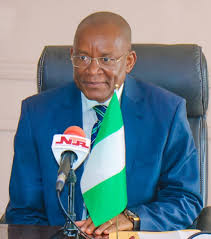Business
China Spends $279bn On Dev, Research
China’s total spending on research and development is estimated to have hit 1.76 trillion yuan (279 billion dollars) in 2017, a year-on-year increase of 14 per cent, China’s Minister of Science said yesterday.
“China needs to enter the ranks of innovative countries and become a big technological innovation power by 2050.
“Basic research and frontier exploration is the big lesson that must be done now,” Minister Wan Gang told a news conference.
China has been trying to ease its dependence on low-end heavy industries and to develop less-polluting ways to promote economic growth and move up the global value chain.
The 2017 spending amounts to around 2.1 per cent of total Gross Domestic Product.
This compares with around 2.8 per cent in the United States, 2.9 per cent in Germany and 3.3 per cent in Japan, World Bank data for 2015 shows.
China’s annual research and spending has risen 70.9 per cent from 2012, Gang noted.
China has established dozens of new high-tech industrial parks and incubators aimed at promoting technologies such as artificial intelligence, robotics and big data.
The country is also investing heavily to dominate industries such as nuclear and renewable energy, high-speed trains and electric vehicles.
Gang told reporters that China was aiming to bring output of electric vehicles up to 2 million units by 2020, double the estimated volume for 2018.
The Chinese currency exchanges at 1 dollar to 6.3115 Yuan.
Business
CBN Predicts 4.17% GDP Growth In 2025

The Central Bank of Nigeria (CBN) has announced that the 2025 economic indices indicate a positive outlook, with the nation’s GDP expected to accelerate to 4.17 per cent for faster economic growth.
Mr Muhammad Abdullahi, Deputy Governor, Economic Policy Directorate, CBN, revealed this on Tuesday during the 11th edition of the National Economic Outlook: Implications for Businesses in 2025.
The hybrid event, convened in Lagos, was organised by the Chartered Institute of Bankers of Nigeria (CIBN) Centre for Financial Studies in collaboration with B. Adedipe Associates Ltd.
Abdullahi said the nation’s 2025 economic projections remained optimistic with fiscal and monetary reforms already paying off, resulting in the GDP anticipated rise from 3.36 per cent recorded in 2024.
According to him, the growth is anchored on sustained implementation of government reforms, stable crude oil prices, and improvements in domestic oil production.
Abdullahi also stated that stability in the exchange rate would play a crucial role in maintaining the positive trajectory, with the inflation rate projected to decline due to the impact of economic reforms.
“Achieving the targeted inflation rate of 15 per cent in 2025 will require effective collaboration between monetary and fiscal authorities, alongside private sector participation for a stable economic environment,” he said.
The keynote speaker said that the apex bank would prioritise price stability and strengthen the financial sector to support SMEs and critical sectors for businesses to thrive.
Abdullahi noted that the nation’s evolving policy landscape presented both challenges and opportunities for businesses to thrive.
“The government is making deliberate strides to diversify its revenue streams and reduce dependence on the volatile oil sector.
“Through ongoing tax reforms aimed at broadening the tax base and improving collection efficiency, the government is working to establish a more sustainable fiscal environment.
“While these reforms may present challenges in the short term, they are essential for building a more resilient and diversified economy in the long run.
“As businesses, it is crucial to adapt to these changes, understanding that they will ultimately strengthen the economic foundation for future growth.
“As we move forward on this path of exploration and collaboration, we must remain focused on the vast opportunities before us.
“Nigeria’s abundant resources, coupled with the current administration’s commitment to economic reform, offer a fertile ground for innovation, investment, and sustainable growth,” Abdullahi said.
Similarly, Prof. Pius Olanrewaju, President/Chairman of the Council, Chartered Institute of Bankers of Nigeria (CIBN), said 2024 presented both challenges and opportunities.
He noted that the GDP signalled gradual recovery amidst global and domestic pressures.
“As we move into 2025, we are presented with both the opportunity and responsibility to critically examine the economic landscape.
“This forum will help us identify the risks, harness the opportunities, and strategize for the future,” Olarenwaju noted.
He commended the collaboration of experts at the annual event, which included Dr Kabir Katata, Director, Research, Policy and International Relations, Nigeria Deposit Insurance Corporation; and Dr Henrietta Onwuegbuzie of the Lagos Business School.
Others were Akinsola Akeredolu-Ale, CEO, Lagos Commodities and Fixtures Exchange; Mr Akeem Lawal, Managing Director Interswitch (Pure pay); and Chinwe Uzoho, Regional Managing Director, West and Central Africa Network International.
Business
Minister Inspects Nigeria/Benin Republic-owned Sugar Firm … Decries Decrepit Condition

Business
NGA Becomes Official Partner To 29th Gas Conference … As President Set To Address 2025 World Summit


